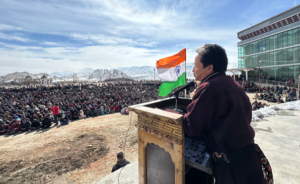While the importance of increasing renewable energy particularly solar energy is now widely recognized, there is need also for giving more importance to its decentralized spread. There has been a tendency of placing more dependence on mega projects taken up by big business houses for expanding solar power capacity in several countries including India, but this can have several adverse impacts including setting a motion a new cycle of displacement of rural communities. In addition such a big business centered approach can never take us towards a people led path of improving and increasing renewable energy, something which is really needed in these times of climate change.
Keeping in view the urgency of this task, the pioneering and sustained work of the Barefoot College (BC, also known as the Social Work and Research Centre) in expanding this work even in extremely remote villages appears like a ray of hope. While the main BC Campus is located at the now famous Tilonia village in Ajmer district of Rajasthan, it has branch centers and sister organizations all over the country who have helped to take this other work to many other parts of the country.
Two additional aspects add to making this work highly commendable. Firstly, women have been in a leading role in this effort, with many important responsibilities being handled by rural women with less formal education. They take up such responsibilities not only within the campus, where help may be available, but look after the entire system in their village entirely on their own.
Secondly, the skills and knowledge have been shared on a continuing basis with women from several developing countries, including some of the poorest African countries, so that this work could reach many countries through the women trained in Tilonia and now actively promoting this work in their villages.
In a single training course, women from many countries come. It is amazing how trainers from Tilonia who have not the remotest knowledge of the languages of these diverse countries initially are nevertheless able to overcome barriers and not only establish a close rapport but also succeed in imparting skills successfully. When I asked a trainer Leela how they manage this, she just smiled, “Well, we just work this out in various small ways.”
This entire work is rooted in excellent, highly experienced training efforts. Villagers, particularly women with very limited formal education are routinely selected for this training and it is a tribute to training skills and methods used at Barefoot College that most of them have given very good results when fulfilling very challenging responsibilities.
Remote rural areas benefit most from decentralized solar energy as these are either served very poorly by the existing electricity grids, or not served at all, so that the people here depend on diesel, kerosene, candles, firewood, etc. to meet their energy and lighting needs.
While efforts to introduce decentralized solar have been made in several villages, many of these could not be sustained beyond a point. One main reason reason for this failure has been that villagers remain completely dependent on outsiders for all technology related issues – whether it is installation, repair or routine maintenance. This problem can be overcome only if local persons can be trained to fabricate, install, repair and maintain renewable energy systems. This is precisely where the Barefoot College has emphasized. In fact the entire thinking of the Barefoot College is based on recognition of rich potential of rural people for taking up diverse responsibilities, with or without formal education, including relatively new technical skills, thereby taking villages towards greater self-reliance.
This work of training Barefoot Solar Engineers was first consolidated in BC’s core work area in Rajasthan. Various village communities were informed about the potential and benefits of solar energy. When requests for installation of solar energy come, energy/environment committees are set up in villages. These in turn select one or more villagers for training as barefoot solar engineers. They agree to pay a modest sum every month to take care of repair and maintenance. This can be utilized to meet the livelihood needs of the barefoot solar engineers.
Once good results had been achieved closer at home, BC got the confidence to take up this work in other areas, including very remote Himalayan villages. Here results were even more heartwarming. Elderly people living in bitterly cold Himalayan villages had only seen dark nights which could be lit very dimly by kerosene lamps or candles. They had never imagined that their homes will be well-lit at night. When barefoot engineers made this possible, these elders showered them with blessings.
As Sevang Dorje, who played an important role with BC in taking solar electricity to Ladakh told me, “In these villages people were forced to trudge a long way on difficult hill paths to fetch their supply of kerosene. But when our elders saw that without depending on kerosene their home is so well lighted they just couldn’t control their emotions.”
So for all their hard work on these mountain slopes, the barefoot solar engineers and their trainers got the most precious gift of the blessings and undiluted joy of these elderly people.
Apart from lighting dark homes, solar energy also provides respected jobs to many local youths in the form of barefoot solar engineers. They also learnt to fabricate solar heaters, use solar energy to dry vegetables, to operate spinning wheel and to lift water for irrigation. Thus a range of other livelihoods could also open up or were enhanced.
Some time back I spoke to women trainees from six African countries including Chad, Sierre Leone, Zambia, Nambia, Kenya and Tanzania. Most of them were grandmothers who are committed to lighting up their remote villages using solar energy. They had come to Tilonia under the Indian Technical and Economic Cooperation Programme of the External Affairs Ministry.
When I spoke to some of the trainees (only very few spoke English) like Susana (from Nambia) and Monica (from Tanzania), I was pleasantly surprised at the progress they made in a few months and the confidence which their training had given them despite problems like the language barrier.
Barefoot solar engineers are provided a 6-month training about the fabrication of charge controllers and inverters, core winding, printed circuit boards, testing, wiring, installation of solar panels and repair and maintenance etc.
With the help of such trainings the solar energy program of the Barefoot College has travelled far and wide – to several states of India, from remote Himalayan villages to remote desert villages, and through training programs to over 20 other countries spread over 3 continents. During a period extending over more than three decades, about 19000 fixed units, solar lanterns, water heaters and parabolic cookers have been fabricated and installed in about a thousand villages, while almost as many barefoot solar engineers have been trained. Needless to add, all this work has contributed not just in many ways to the development and comfort of these villages and to livelihoods, but in addition this has also resulted in significant reduction of GHG emissions, while creating the potential of much more to come.
(Bharat Dogra is Honorary Convener, Save the Earth Now Campaign. His recent books include Planet in Peril and Protecting Earth for Children.)




